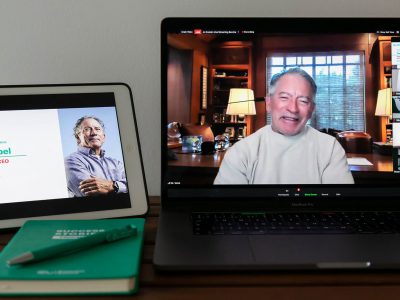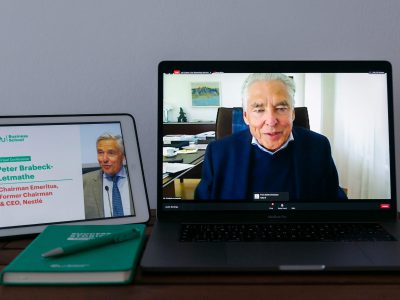The thought of speaking in front of a group fills most people with fear and nervous anxiety. Only a tiny percentage of people are born speakers. Yet the ability to address a crowd, confidently articulate a theory, share a business idea or deliver a sales pitch is invaluable for building a successful career. The good news is that public speaking is a skill that can be learnt, perfected and developed over time.
In this #EULive webinar, Joanne Jankowski, a personal and professional coach and lecturer in human resources and communications, took students through some essential tips to enable even the timidest to become confident public speakers. Here, we’ve recounted her advice, including a list of resources for those who’d like to learn more about the subject.
Why Is Public Speaking Important?
“You will be worth 50% more if you improve this one human skill.”
Warren Buffet
Considered solely from a business perspective, there are many reasons public speaking is an important skill to master:
- Building strong relationships with stakeholders –Ultimately, your ability to communicate effectively with stakeholders will translate into profitability. Consider, for example, delivering a sales pitch or trying to get investors behind your business idea: clearly articulating your needs and transmitting your passion will be essential to achieving your aims.
- Motivating employees – Communication is key to becoming a great leader. You need to be able to explain your company mission and energize employees to work hard. Higher levels of productivity will have a positive effect on the bottom line.
- Marketing and PR – As an entrepreneur or CEO, you will be expected to have a public presence. Your role will be to drive forward the visibility and reputation of your company, to reach new audiences, forge new partnerships and raise money from investors. This could include speaking at events, recording videos for your website or having an active presence on social media. All these instances require you to be confident when speaking in public.
- Career progression – In a 2016 study, Bloomberg found that public speaking skills were one of the most valuable and hardest to find in candidates. Honing your communication skills will give you a competitive advantage in the job market.
“The art of communication is the language of leadership.”
James Humes
How to Become A Better Public Speaker
It is important to remember that one size does not fit all – there is no set formula you can follow to become a great speaker. The key to public speaking really lies in finding your own style, being authentic and sharing your passion. Above all, it is down to practice.
However, Joanne shared some helpful tips that can support your journey to becoming a confident and strong public speaker.
Start with Why
Just as Simon Sinek urges all entrepreneurs and companies to find their ‘why’, as a speaker you should do the same.
Ask yourself: Why are you giving this speech? Go beyond the immediate impact to think about the end goal. For example, if you need to raise funds, why? What are you going to do with that money and why do you think it’s important?
Know Your Audience
Professional speechwriters often conduct detailed audience analysis to understand who they are talking to. There are two key types of analysis you can perform:
- Demographic – Simple details such as the age, gender and ethnicity of your audience can help you to tailor your approach to create an engaging and persuasive speech.
- Psychographic – This will help you understand the culture, beliefs and values of your audience. Although not essential for every speech, if you’re covering any sensitive subjects it’s prudent to make sure you’re respectful of your audience.
Insights from your audience analysis should inform the way you write and deliver your speech.
Where Are You Speaking?
Depending on where you are giving your speech, your delivery will be different. Online conferences, for example, don’t allow you to use body language and gestures to the same effect.
Consider how you can use the space you have to your advantage. Make sure you have the equipment you need, such as a microphone or lectern, organized in advance so that you can focus on your delivery.
What Are You Going to Say?
First and foremost, the topic should be something you feel passionate about. When delivering a speech we transfer our energy onto our audience. If we believe what we’re saying, they’ll be more encouraged to believe it too.
Make sure that you are well informed and verify your facts. Audiences have Google at their fingertips. They will challenge you and ask questions. Safeguard your credibility by making sure you have data and sources to hand.
The Writing Process
Before you start writing the speech itself, prepare an outline. As you conduct your research, build this onto the structure as you go. That way, when it comes to writing up the speech you will be sure that the finished result will achieve what you set out to do.
Effective speeches (and writing) should Persuade, Inform and Entertain. PIE is a helpful framework to keep in mind when you are preparing and planning your speech.
Here are some tips for a strong structure:
- Open with a story, question or quote to secure the attention of your audience.
- Give an overview of your talk before you get started to reassure the audience; people like to know what’s coming.
- We remember things in chunks and three is a magic number; consider structuring your content into three distinct sections.
- Leave your audience with something memorable, such as a quote, a thought-provoking rhetorical question or even a joke.
The language you choose and the way you articulate your speech will influence how the audience receives it. The best speakers use the simplest possible language to get their message across. Try not to get caught up in using complex language to sound informed; if the audience is not able to follow what you are saying they will get bored. Clarity and simplicity are key; eliminate all verbal clutter and get straight to the point.
Think of your speech as a story and create a strong image in the minds of your audience. Using metaphors and repeated tropes will aid memorability; think of the infamous ‘I have a dream’ speech by Martin Luther King. Appeal to the audience’s emotions to embed what you are saying in their hearts and minds.
Delivering a Speech to Remember
“Rehearse twice as much as you need to.”
Steve Jobs
To deliver a great speech it is essential to practice, again and again. The better you know your speech, the more relaxed you will be when you deliver it in front of an audience. Take your notes with you if you want to; knowing they are to hand can be reassuring.
If you feel confident this will transmit to the audience and you will come across as a memorable and convincing speaker. That’s easier said than done, of course, but there is a way we can trick our brains into believing we are more confident than we feel. As psychologist Amy Cuddy revealed in her Ted Talk, it’s been scientifically proven that standing in a confident, powerful pose for a couple of minutes can make us feel more confident. Just as forcing a smile when we feel down can make us actually feel happier.
“Effective communication is 30% what you know and 70% how you feel about what you know.”
Unknown
Here are some tips for your delivery:
- When you’re on stage make sure you hold yourself with confidence. Think about your posture and do not slouch or put your hands in your pockets.
- Make eye contact with the audience, this will establish a connection and show them you are trustworthy.
- Be moderate with your gestures; while some demonstrative hand movements can add emphasis to what you are saying, waving your arms around will be incredibly distracting.
- Make sure that you clearly annunciate and project your voice and speak at a moderate pace; too fast and the audience will be confused, too slow and they will lose interest.
- Finally, dress the part. Not only will dressing smartly give you confidence, it will show the audience that you respect both them and the occasion.
Many of us are terrified by the idea of speaking in public. But you can overcome this with practice and by starting small. Speak at a family occasion, practice by sharing your ideas in the classroom or by addressing colleagues at meetings. Little by little increase the number of people you speak to, and the formality of the occasion, and you will slowly build confidence. It is also helpful to ask yourself: what is the worst that could happen? If you make a mistake your audience will probably not notice, and if they do, they will be sympathetic. Acknowledge to yourself that whatever happens it will be okay, and you will feel calmer.
“Communication works for those who work at it.”
John Powell
Improve Your Public Speaking and Communication Skills
At EU Business School, practical experience as well as theoretical understanding underpins our approach to perfecting fundamental business skills, including communication. Find out more about our methods and our programs, including our top-ranked BA in Communications & Public Relations.

Resources
Joanne mentioned several resources that build on the ideas shared in her session. Delve into these if you’d like to master the art of public speaking.
- Book: Talk Like Ted by Carmine Gallo.
- Book: The Art of Public Speaking by Stephen Lucas.
- Martin Luther King Jr., I have a Dream. Watch this iconic speech here.
- Tony Robbins is a motivational speaker. Find his YouTube channel with many examples to learn from here.
- Barak Obama is widely acknowledged as a textbook brilliant speaker. Watch some of his best speeches here.
- Michelle Obama was mentioned by Joanne as the female speaker she most admires. Enjoy some of her best speeches here.
- Your Body Language May Shape Who You Are, Ted Talk by Amy Cuddy here.
- Start with Why, Simon Sinek – a Ted Talk, as well as a book and lots of helpful materials which you can find on his website here.









